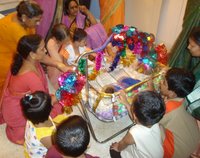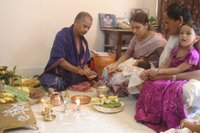 When it comes to life-cycle rituals, Hindu culture beats Buddhist culture (or at least Tibetan Buddhist culture), hands down. I attended my third one in two weeks, this time a ceremony to give a newborn child its name, called nāmakarma. Much more than announcing the name, this ritual is a sort of formal introduction of the child to his community, the extended family. Two quite beautiful practices put all the relatives in the role of caregiver to the child – first, men and women alike will have a chance to give the child milk and later rock the child to sleep, allowing all to share in these two central acts of motherly love.
When it comes to life-cycle rituals, Hindu culture beats Buddhist culture (or at least Tibetan Buddhist culture), hands down. I attended my third one in two weeks, this time a ceremony to give a newborn child its name, called nāmakarma. Much more than announcing the name, this ritual is a sort of formal introduction of the child to his community, the extended family. Two quite beautiful practices put all the relatives in the role of caregiver to the child – first, men and women alike will have a chance to give the child milk and later rock the child to sleep, allowing all to share in these two central acts of motherly love.  The overall ceremony begins with the offerings of flowers, rice and other substances to the gods and Vedic chanting that form a backbone a staple of these life-cycle rituals (see photo).
The overall ceremony begins with the offerings of flowers, rice and other substances to the gods and Vedic chanting that form a backbone a staple of these life-cycle rituals (see photo).  After this ritual is completed, each person scoops up a tiny bit of milk with one of the parents’ gold rings and gives a drop or two to the child (see photo). Later, the infant is placed in a cradle and everyone is invited to take a turn rocking the baby to sleep. As the child is being rocked, the women of the family gather to sing a lullaby (see photo, women singing in background.) Unlike the English lullaby in which the cradle is made to fall from a tree, this one tells the infant he or she is lying on the bedrock of the world, held up by the four Vedas and escorted by divine protectors.
After this ritual is completed, each person scoops up a tiny bit of milk with one of the parents’ gold rings and gives a drop or two to the child (see photo). Later, the infant is placed in a cradle and everyone is invited to take a turn rocking the baby to sleep. As the child is being rocked, the women of the family gather to sing a lullaby (see photo, women singing in background.) Unlike the English lullaby in which the cradle is made to fall from a tree, this one tells the infant he or she is lying on the bedrock of the world, held up by the four Vedas and escorted by divine protectors. After the child has been rocked by the adults in the tradition cradle made of a cloth tied to the ceiling, it is placed in a cradle on the floor and children are invited to join in and help put the child to sleep. The infant’s older sibling has been very much included in each phase of the ritual, sitting on her parents’ laps even during the most complex stages of the ritual, feeding milk to her brother and now rocking him to sleep.
After the child has been rocked by the adults in the tradition cradle made of a cloth tied to the ceiling, it is placed in a cradle on the floor and children are invited to join in and help put the child to sleep. The infant’s older sibling has been very much included in each phase of the ritual, sitting on her parents’ laps even during the most complex stages of the ritual, feeding milk to her brother and now rocking him to sleep. Based on the astrological chart of the infant, this ceremony might also mark the first time that certain male relatives are permitted to see the child’s face, including even the father if the stars suggest he should not. In the case of the baby boy whose naming ritual I attended today, there had been no prohibitions against seeing his face earlier.
Based on the astrological chart of the infant, this ceremony might also mark the first time that certain male relatives are permitted to see the child’s face, including even the father if the stars suggest he should not. In the case of the baby boy whose naming ritual I attended today, there had been no prohibitions against seeing his face earlier. Meanwhile, it is at this ceremony that the child’s name is first made public. At this ritual, the child was already three weeks old, but nearly everyone was hearing the child’s name for the first time, including grandparents and his older sister. Here it is the child’s father who decides the name, perhaps in consultation with relatives. In this case, the father had still been weighing options up to the last minute. The name is announced – Madhav Simha and much discussion breaks out as relatives state the name to one another and comment on the choice. The strongest comments come from the infant’s four-year old sister, who greets this proposal a scowl and a vigorous shake of the head. No, she insists, to much laughter, his name is ‘Tamuru’ - the local term for ‘Brother.’


No comments:
Post a Comment